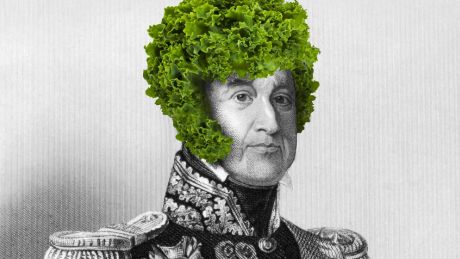The Nutritional Benefits of Kale: Why You Should Eat More of the Stuff
Turns out the latest diet fad is actually worthy of its health food crown. Here are five reasons why kale deserves its praise

In This Series
- All Hail King Kale! Why You Should Eat More of the Stuff
- Easy Kale Recipes
It’s hard to avoid kale these days. The so-called superfood is found in everything from salads to smoothies because of its antioxidant phytochemical content. And now new research suggests that the leafy green can also improve heart health: subjects drank 150ml of kale juice every day for three months and then had their blood compared with their pre-trial samples. The results, published in the Biomedical And Environmental Sciences journal, found that blood concentrations of healthy HDL cholesterol increased 27% and that the ratio between “good” HDL and “bad” LDL cholesterol improved 52%. High LDL cholesterol can significantly increase the risk of coronary heart disease.
Contrary to popular belief, kale didn’t suddenly explode upon us in a sudden leafy green haze. It was actually a dietary staple of the ancient Greeks and Romans and is a valued member of the brassica oleracea species, along with cabbage, broccoli, Brussels sprouts and cauliflower.
After falling into disuse, it made a hearty comeback during the Second World War, when due to its high nutrition content it was considered the perfect supplement to the rationed diet, and became widely grown throughout Britain. Most of the kale you buy in your local supermarket will have been grown by farmers in Lincolnshire, where the moisture-retentive and mineral-rich soil presents near-perfect conditions.
When it comes to nutritional goodness, kale has it all. Vitamins? Check. There’s boatloads of K, C and possibly the Sunshine Band as well. Minerals? You betcha! There’s plenty of bone-boosting calcium, as well as magnesium and iron. A single serving contains more absorbable calcium than a small carton of milk, and due to an abundance of fibre and omega fatty acids, people who may never have seen a burger (let alone a cow) have labelled it “the new beef”.
It helps that according to Julie Morris, author of Superfood Smoothies, cooked kale offers more iron per gram than beef. It can also lower cholesterol, and three handfuls only amounts to 100 calories. All in all, a mere 100g serving contains 200% of your recommended daily allowance (RDA) of vitamin C, 300% of the RDA of vitamin A and a whopping 1,000% of the RDA of vitamin K1, most valued for helping blood to clot. It’s also tireless in its commitment to building strong bones and preventing heart disease. Here are but five of the benefits of kale. Bow down, you are not worthy.
Kale Helps you to Push Yourself
Your body needs iron for circulating oxygen, and it needs it most while you’re exercising. You’ll get tired quickly if you’re missing out and your endurance will suffer. Kale is a low-calorie way of raising your iron levels – try throwing some in with your scrambled eggs first thing in the morning or just before you hit the gym for the best results.
Kale Builds Muscle
Kale has more protein per calorie than fatty cuts of beef, so you can build and repair your muscles without the risk of gaining fat. Next time you need fuel for your post-workout recovery, skip the red meat and instead opt for a nutrient-rich raw kale burger. We aren’t saying red meat is bad – just that variety is better.
Get the Coach Newsletter
Sign up for workout ideas, training advice, reviews of the latest gear and more.
Kale Contributes to Strong Bones
Calcium is essential for building strong bones and protecting them from damage caused by intensive exercise. You can get 15% of your daily serving in 100g of kale, compared to just 12% in 100g of milk. Load up on vitamins and minerals and bypass the high fat and calorie content of milk by adding kale to vegetable smoothies to quench your thirst.
Kale Aids Recovery
Vitamin C is a powerful antioxidant, which means it’s fantastic at helping your aching muscles repair themselves after gruelling workouts. Without vitamin C you’ll struggle to get back to the gym once you’ve felt the burn. Give your training an edge by piling kale into a green stir-fry after a lifting session – you’ll need just 50g for your recommended intake of vitamin C.
Kale Can Be Indulgent
We all need a treat now and then, and kale is a virtually guilt-free snack. Use the recipe on the next page to make garlic-roasted kale crisps to snack on throughout the day. You can even bake kale into cookies and brownies to give your cheat days a health kick.
